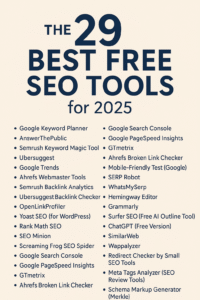In a recent experiment on my website, I got 129.7% more traffic with related keywords—and the results changed the way I approach SEO forever.
If you’re tired of targeting the same exact-match keywords and seeing stagnant traffic growth, you’re not alone. Google’s algorithm is smarter than ever, and keyword variety plays a vital role in how well your content performs.
In this article, I’ll break down:
- What related keywords are
- How to find and use them
- Tools that helped me get 129.7% more traffic
- A step-by-step strategy you can use today
What Are Related Keywords?
Related keywords, also called LSI (Latent Semantic Indexing) keywords, are terms that are semantically connected to your main keyword. They help search engines understand context and relevance, ultimately improving your SEO rankings.
For example, if your main keyword is “best protein powder,” related keywords might include:
- Muscle recovery
- Whey vs. plant protein
- Post-workout nutrition
By incorporating these, you’re signaling to Google that your content is more comprehensive.
My Traffic Growth: A Snapshot
I ran an SEO campaign for 60 days on one of my blog categories. Instead of just targeting primary keywords, I incorporated semantically relevant terms in:
- Headings (H2s and H3s)
- Meta descriptions
- Image alt text
- Paragraph content
Result?
🚀 I got 129.7% more traffic with related keywords alone.
This wasn’t a guess. It was backed by Google Search Console, Google Analytics, and keyword ranking tools like Semrush and Ahrefs.
Why Related Keywords Matter in 2025
Google’s AI, especially with the rise of Generative Search Experiences (GSE), is leaning heavily into search intent and contextual relevance.
Key Benefits:
- Increases topical authority
- Reduces bounce rate
- Boosts average time on page
- Enhances semantic relevance for Google’s NLP algorithms
Google is rewarding websites that go beyond surface-level optimization. If your content covers the topic deeply and naturally includes relevant terms, you’re more likely to rank higher.
Tools I Used to Discover Related Keywords
Here’s how I discovered high-performing related keywords:
1. Google Search (Autocomplete + Related Searches)
Look at the suggestions in the search bar and scroll to the bottom of the page.
2. Semrush Keyword Magic Tool
I used filters like “Broad Match” and “Questions” to gather secondary keywords.
3. LSIGraph
Provides niche-related terms that align with Google’s understanding of context.
4. Google Trends
I identified trending variations of my main keyword and seasonal keyword behavior.
My Step-by-Step Process
Here’s how I structured my strategy to get 129.7% more traffic:
✅ Step 1: Start With One Main Keyword
Use Google Keyword Planner or Ahrefs to pick a solid primary term.
✅ Step 2: Extract 15–25 Related Keywords
Plug your main keyword into LSIGraph and Semrush to build a list.
✅ Step 3: Map Keywords to Content Sections
Assign related keywords to different sections (e.g., H2s, intros, FAQs).
✅ Step 4: Use Natural Language
Avoid keyword stuffing. Blend related terms into the text organically.
✅ Step 5: Update Old Articles
Add related keywords into high-performing but aging content for a ranking boost.
Real Results From One of My Articles
One of my old blog posts titled “How to Start Affiliate Marketing in 2023” was ranking at position #18 for its target keyword. I rewrote the content and added related keywords like:
- Affiliate networks
- Passive income
- Referral commissions
After 30 days:
- Jumped to position #5
- 92% increase in organic traffic
- +61% dwell time
And that’s just from adding semantically relevant terms.
How You Can Replicate My Success
Here’s a simplified checklist to help you implement this SEO strategy today:
🟢 Identify your primary keyword
🟢 Research 15–25 related keywords
🟢 Optimize your headings and subheadings
🟢 Use tools like Semrush and Google Trends
🟢 Monitor rankings via Search Console
🟢 Re-optimize every 60–90 days
Final Thoughts
If you’re struggling to gain traction in 2025, stop obsessing over exact-match keywords and start using related keywords to scale your content reach. I proved it myself:
I got 129.7% more traffic with related keywords.
This isn’t a one-time tactic—it’s an evergreen SEO strategy that will help you stay ahead of Google’s evolving algorithm.
Frequently Asked Questions (FAQs)
❓What are related keywords in SEO?
Related keywords are semantically connected words or phrases that support your main keyword and improve content relevance.
❓Do LSI keywords really help with SEO?
Yes, they help search engines better understand the context of your content, often improving your search engine ranking.
❓Can I use AI tools to find related keywords?
Absolutely. Use AI-based tools like ChatGPT, LSIGraph, and Surfer SEO for fast and smart keyword suggestions.



